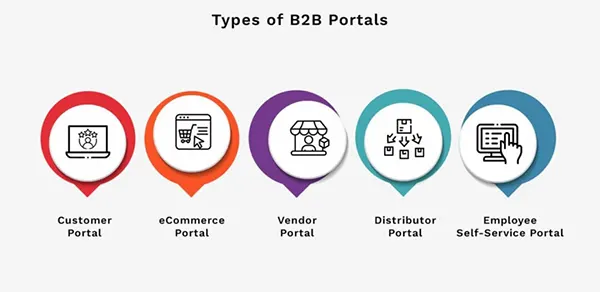The New B2B Business Model: Using Web Portals to Stay Ahead of the Competition
Have you ever wondered how B2B business models are growing at a rapid pace? The B2B (Business-to-Business) model is combining with the power of web portals to provide their services to other businesses and clients directly on the portal.
The web portals are acting as a bridge that connects various suppliers, manufacturers, and buyers to other businesses. This has reshaped how businesses used to buy and sell services and products.
Want to explore more? Continue reading this article to have a deep understanding of how web portals are changing the way the B2B world works. Also, explore what other benefits are being provided by web portals to B2B models, buyers, and suppliers.

Key Takeaways
- Web portals have given a competitive edge to the B2B business models.
- Faster information access and real-time access are the core benefits of the B2B business model.
- Web portals of B2B business models have effectively cut down the cost.
- The future of B2B business models will have a huge impact of AI on it.
Why Web Portals Matter
A web portal is not just any tool; It is the core of the modern B2B strategy. Web portals provide one place where businesses and clients can manage everything, and give clients a direct line to the business. Orders, invoices, product catalogs, and even support tickets live inside a single dashboard.
To see the bigger picture, think about how web portals solve common problems B2B companies face. Wholesale suppliers once leaned on long spreadsheets. Logistics firms often juggled paper records, while manufacturers spent hours confirming shipments by phone. A portal replaces all of that mess and organizes it. The process is not just easier, but faster and far more reliable.
Faster Access to Information
Information delays kill deals. A client who cannot get clear pricing or stock details may go elsewhere. The web portal solved all this. Buyers can log in and see updates in real time, and can check inventory, confirm lead times, and finalize purchases without waiting on a rep. This instant access builds confidence.
Clients know the numbers are accurate. Businesses avoid costly errors. The portal runs day and night, which is ideal for firms with clients in different time zones, and this twenty-four-hour service keeps everyone connected.
Streamlined Communication
Emails get lost. Phone calls take time. Misunderstandings creep in. A portal eliminates much of that risk. Messages, updates, and files live in one space. Clients see exactly where their order stands. They can download invoices, view shipment details, or track progress without sending a single reminder.
This clarity strengthens trust. Clients appreciate not being left in the dark, and the staff feel less pressure because they spend less time answering routine questions. The relationship shifts from reactive to proactive. That change makes the bond stronger and more professional.
Smarter Data Use
Portals also create valuable data. Every order and every request leaves a digital trail. Over time, those records reveal patterns. A company might learn that one client always increases orders in the summer. Another may show steady growth year after year.
Businesses can use this knowledge to forecast better and adjust stock levels before demand spikes. They can even tailor promotions to specific groups. What once felt like guesswork now feels precise. Marketing also becomes more targeted. Instead of broad campaigns, firms can design messages that resonate with the right audience.
Cost Savings and Efficiency
Money always matters in B2B. Portals help reduce waste as they cut down on paperwork, limit manual entry, and lower human error. A task that once needed hours of staff time now takes minutes.
These savings ripple through the company. Teams can focus on strategic work like product development or client care. Automation handles repetitive jobs. The business grows leaner but also more capable. Efficiency becomes a competitive weapon.
Competitive Advantage
Standing out in B2B is not simple, as many companies sell similar products at similar prices. What makes a difference is the experience. A portal provides that edge. Clients remember how smooth the process felt. They remember not having to chase down updates. That memory brings them back.
The advantage grows as companies scale. Without a portal, growth adds stress. With one, growth feels manageable. The system expands with demand. It keeps operations steady even when the client base doubles. That flexibility separates leaders from laggards.

Looking Ahead
This shift to web portals is not a passing trend. It reflects deeper changes in how business is done. Clients now expect the same digital convenience in B2B that they enjoy in consumer apps, and companies that fail to deliver that ease risk losing relevance.
Future portals will likely grow smarter. AI and automation will refine the experience further. Predictive tools may suggest stock levels before a client asks. Dashboards may offer insights tailored to each buyer. The potential is huge, and companies that adopt early will benefit most.
Interesting Fact
Surveys have shown that most B2B companies are shifting to web portals just because they love this app-like experience in their businesses.
Conclusion
The modern B2B model demands speed, clarity, and adaptability. Web portals provide all three – they centralize information, improve communication, unlock data insights, and reduce costs. More than that, they give companies a lasting competitive edge.
For today’s B2B firms, portals are no longer optional add-ons. They are essential systems. By embracing them, businesses not only keep up with the market but also set the pace. Those who act now position themselves as leaders. Those who wait risk being left behind.
Ans: B2B is a digital platform that helps businesses to directly connect with other businesses, clients, and their partners. It helps in connecting easily with services like orders and invoices.
Ans: In the B2B business model, web portals provide a platform to the clients and businesses to directly connect with each other.
Ans: When the right businesses meet with their right clients, then the best services are shared and offered at the best possible price.
Ans: Yes, it has gained a lot of popularity and is completely trustworthy. Still, it is advised to verify before making any deal.
